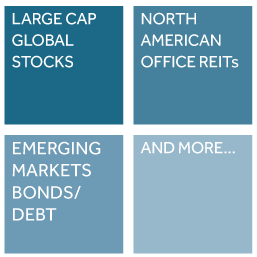FIRST, A QUICK PRIMER
WHAT IS AN INDEX?
Generally speaking, an index is an indicator or measure of something. In simple terms, in the world of investing, an index is a hypothetical portfolio of securities designed to represent an asset class, market, or market segment.
KEY TERMS

WHY INDEXES?
Markets or individual market sectors can be enormous, including hundreds and even thousands of securities.
Buying all these securities just to access one market or trend can be expensive and time consuming. And it can be ineffective. That approach inevitably would include securities with negligible influence on the portfolio.
Indexes are comprised of only the securities most relevant to their investment theme, which allows you to follow market trends without having to track the entire available universe of securities. Essentially, an index acts as a measuring stick to capture representative exposure to a particular market or sector.

Chances are, if you can imagine it, there’s an index for it.
And you can use it in a variety of ways:

Assess a given market's performance
Gauge how well an active strategy is working
Serve as the foundation for CITs, mutual funds, or Separately Managed Accounts (SMAs)
Evaluate a market's risk profile or its diversification benefits
Measure factor risk premia
INDEXES AS A BASIS FOR
COLLECTIVE INVESTMENT TRUSTS
Because an index is a hypothetical basket of securities, it cannot be invested in directly. However, indexes are widely licensed by fund managers as the basis for CITs, as well as other investment vehicles, including:

Let’s say you feel strongly that large-cap US equities are going to outperform small-cap US equities over the long term. You may seek exposure to only the large-cap US equities market segment then.
Rather than purchasing each US large cap stock individually, you adopt a passive strategy. You choose an investment product that tracks an index designed to represent precisely just the US large-cap equities market.
CHOOSING PASSIVE
INVESTMENT PRODUCTS
While some investors prefer actively managed investments, which rely on a manager’s stock selection skills, others turn to passively managed investment products for the following reasons:

